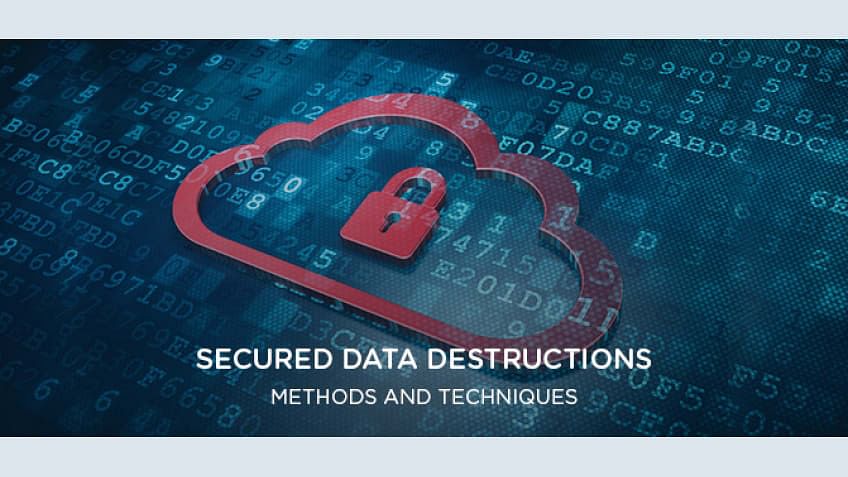How Robust Data Destruction Boosts Your Overall Cyber Security Procedures
Wiki Article
The Crucial Nature of Data Damage in Upholding Computer System Safety Services and Protecting Versus Unauthorized Access
In an era where data breaches and identification burglary are increasingly widespread, the significance of effective information destruction can not be overstated. Organizations must identify that the failure to appropriately dispose of delicate info poses not only lawful and financial threats however also a prospective erosion of client trust fund. Different approaches, from data wiping to physical devastation, act as crucial safeguards versus unauthorized gain access to. Recognizing the ramifications of data destruction methods and conformity with laws increases important concerns about the adequacy of existing strategies and their long-term feasibility in the face of evolving hazards.Relevance of Data Damage
In a progressively electronic world, the significance of data devastation can not be overemphasized. As organizations generate huge quantities of delicate info, the possible effects of stopping working to properly get rid of and manage of that data come to be increasingly extreme. Data violations, identity burglary, and business reconnaissance position considerable dangers, highlighting the requirement of reliable information damage techniques.In addition, as modern technology advances, so as well do the approaches whereby harmful actors seek to make use of sensitive info. Organizations needs to stay proactive and attentive in their information destruction methods to guard against these progressing dangers. By focusing on information destruction, companies not just secure their properties but likewise foster count on among stakeholders and clients, demonstrating a dedication to accountable information management and security practices.
Methods of Effective Information Destruction
To guarantee the permanent and complete destruction of delicate data, companies can use a range of reliable techniques customized to their particular needs. Among the most typical methods is data wiping, which entails making use of specialized software program to overwrite existing data multiple times, making recuperation basically impossible. This is especially useful for solid-state drives and hard drives, where typical deletion techniques are poor.One more effective strategy is degaussing, which makes use of solid magnetic fields to interrupt the magnetic domains on storage media, providing the information irretrievable. This technique is especially matched for magnetic storage space tools, such as tape drives and hard drives.
Physical destruction is additionally a practical alternative, including the shredding, crushing, or incineration of storage space gadgets. This technique assurances that data can not be recuperated, making it suitable for companies handling highly delicate info.

Conformity With Data Protection Regulations
Organizations must not only focus on reliable information destruction techniques but likewise make sure compliance with data defense laws that govern how sensitive details is taken care of and taken care of. Complying with these laws is vital for safeguarding individual data and maintaining consumer trust. Regulations such as the General Information Protection Policy (GDPR) in the European Union and the Medical Insurance Transportability and Responsibility Act (HIPAA) in the United States enforce strict guidelines on information monitoring, that include requirements for the protected disposal of sensitive information.To attain conformity, organizations need to implement extensive information devastation policies that align with these legal structures. This includes determining information that calls for devastation, developing protocols for secure methodsâEUR" such as shredding physical media or making use of software application that satisfies sector criteria for data wipingâEUR" and preserving detailed documents of destruction tasks. Normal audits needs to be performed to ensure adherence to these plans and to recognize any potential areas for renovation.
Failing to follow information security guidelines can cause significant legal implications, consisting of substantial fines and damage to a company's online reputation. Integrating conformity into data look at here now destruction practices is official website not just a lawful obligation but likewise a vital part of a robust information protection approach.
Repercussions of Poor Data Handling
Poor information handling can result in serious effects that extend beyond instant functional setbacks. Organizations might encounter substantial monetary losses due to information violations, which typically result in pricey removal initiatives, lawful costs, and regulative penalties. These monetary effects can strain sources and hinder development, ultimately impacting an organization's profits.
Additionally, poor data handling can badly damage a company's online reputation. Customers, stakeholders, and companions may lose rely on an entity that fails to secure delicate info, resulting in decreased customer loyalty and possible loss of service opportunities. This erosion of depend on can take years to rebuild, if it can be recovered in any way.
In addition, organizations might encounter lawful ramifications arising from non-compliance with information protection laws. Such infractions might cause fines and investigations, intensifying the economic concern and additional tarnishing the organization's picture.
In the realm of cybersecurity, poor information monitoring methods can create susceptabilities that make systems a lot more vulnerable to unapproved gain access to and cyberattacks. Eventually, these repercussions underscore the crucial relevance of implementing robust data dealing with procedures to protect sensitive information and preserve business stability.
Ideal Practices for Secure Information Disposal


Firstly, information ought to be identified according to its sensitivity. Delicate information calls for extra rigorous disposal approaches, such as shredding physical records and utilizing advanced software for digital information wiping. Employing certified data damage services makes certain compliance with market policies and requirements.
Secondly, companies need to implement an information disposal policy that mandates routine audits. This policy should describe the treatments for data retention and devastation, ensuring that obsolete data is disposed of promptly and securely. Training staff members on these protocols is necessary to cultivating a society of security awareness.
Lastly, maintaining in-depth documents of disposed information enhances accountability and offers a clear audit path. This documentation should include the kind of data damaged, the technique utilized, and the day of disposal.
Verdict
Embracing durable methods such as data cleaning, degaussing, and physical devastation, alongside compliance with guidelines like GDPR and HIPAA, is important for guarding sensitive info. Disregarding appropriate data disposal techniques can lead to extreme consequences, consisting of information breaches and lawful effects.In a period where information breaches and identification burglary are progressively widespread, the importance of reliable information damage can not be overemphasized. data destruction. Data breaches, identity theft, and business reconnaissance posture significant dangers, emphasizing the need of reliable information devastation techniques
Conformity with laws such as GDPR and HIPAA mandates that companies implement stringent data defense steps, consisting of the safe devastation of information at the end of its lifecycle.
By focusing on data damage, companies not only safeguard their assets but also foster trust amongst customers and stakeholders, demonstrating a dedication to accountable data monitoring and safety and security practices.
Organizations must not just concentrate on efficient data devastation techniques however also ensure conformity with information protection regulations that control exactly how sensitive information is taken care of and disposed of.
Report this wiki page